Moderate overlap front: original test
Rating applies to 2022-24 models
Tested vehicle: 2022 Nissan Frontier SV Crew Cab 2wd
The Nissan Frontier was redesigned for the 2022 model year. Moderate overlap front ratings are assigned by the Institute based on a test of a 2022 Frontier crew cab conducted by Nissan.
| Evaluation criteria | Rating |
|---|---|
| Overall evaluation | |
| Structure and safety cage | |
| Driver injury measures | |
| Head/neck | |
| Chest | |
| Leg/foot, left | |
| Leg/foot, right | |
| Driver restraints and dummy kinematics | |
Moderate overlap front: updated test
Rating applies to 2022-25 models
Tested vehicle: 2022 Nissan Frontier S Crew Cab 4wd
The Nissan Frontier was redesigned for the 2022 model year.
| Evaluation criteria | Rating |
|---|---|
| Overall evaluation | |
| Structure and safety cage | |
| Driver injury measures | |
| Head/neck | |
| Chest | |
| Thigh/hip | |
| Leg/foot | |
| Driver restraints and dummy kinematics | |
| Rear passenger injury measures | |
| Head/neck | |
| Chest | |
| Thigh | |
|
Rear passenger restraints and dummy kinematics
| |
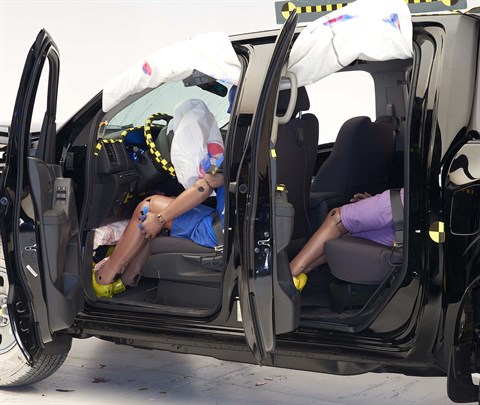
View of the vehicle after the crash showing the airbags and damage to the occupant compartment.
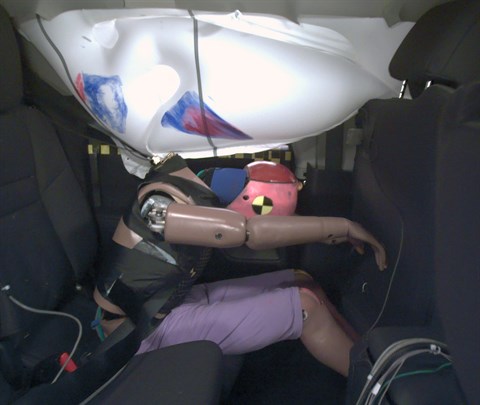
The rear passenger dummy's head came close to contacting the front seatback, which increases the risk of head injuries.
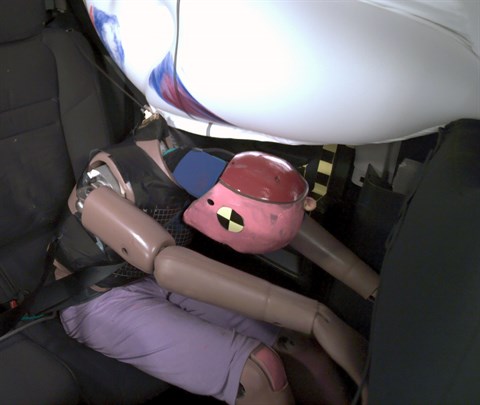
Rear passenger dummy injury values indicate a low risk of injury to the head or neck and chest. During the crash, the shoulder belt remained in an ideal position on the dummy’s chest.

The rear passenger dummy's lap belt remained in the ideal position on the pelvis.
Side: updated test
Rating applies to 2022-25 models
Tested vehicle: 2022 Nissan Frontier S Crew Cab 4wd
The Nissan Frontier was redesigned for the 2022 model year.
| Evaluation criteria | Rating |
|---|---|
| Overall evaluation | |
| Structure and safety cage | |
| Driver injury measures | |
| Head/neck | |
| Torso | |
| Pelvis | |
| Driver head protection | |
| Rear passenger injury measures | |
| Head/neck | |
| Torso | |
| Pelvis | |
|
Rear passenger head protection
The dummy's head contacted the seat belt D-ring and C-pillar hard, through the side curtain airbag. The head protection is inadequate. | |
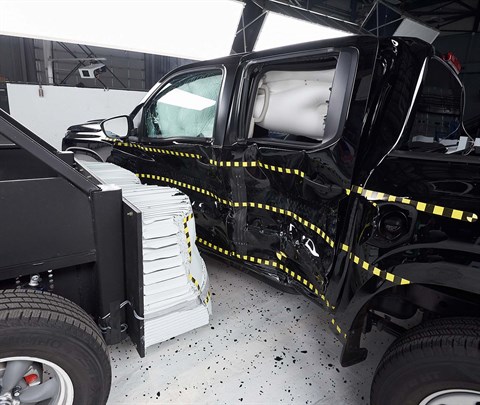
View of the vehicle just after the crash test.
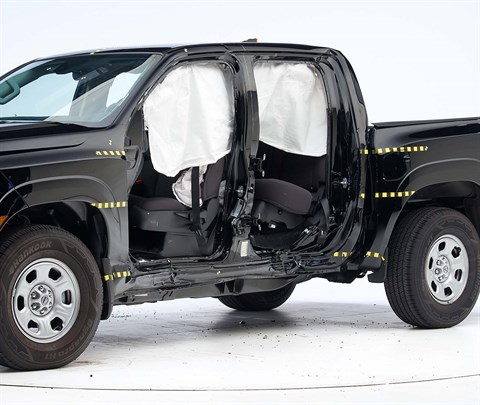
View of the vehicle after the crash with doors removed, showing the side airbags and damage to the occupant compartment.
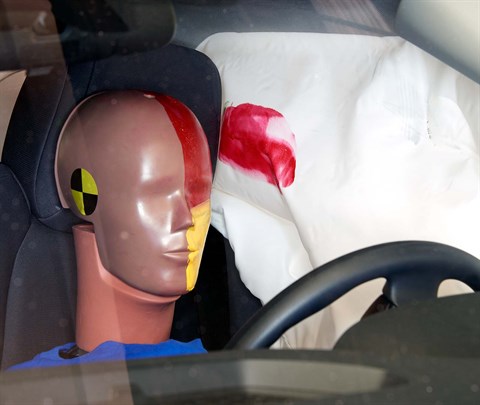
Smeared greasepaint shows where the driver dummy's head was protected from being hit by hard structures by the side airbags.
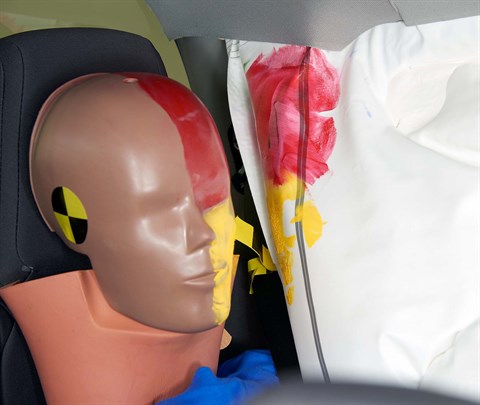
The dummy's head contacted the seat belt D-ring and C-pillar through the side curtain airbag.
Headlights
Ratings are given for 3 different headlight variations available on this vehicle.
Trim level(s)
- SV trim equipped with Premium package
- SV trim equipped with Midnight Edition package
- Pro-X trim
- Pro-4X trim
| Evaluation criteria | Rating |
|---|---|
| Low-beam headlight type | LED reflector |
| High-beam headlight type | LED reflector |
| Curve-adaptive? | No |
| High-beam assist? | Yes |
|
Overall rating | |
| Distance at which headlights provide at least 5 lux illumination: | |
Low beams
On the straightaway, visibility was good on the left side of the road and fair on the right side. On curves, visibility was good on the sharp left and both right curves and fair on the gradual left curve.
The low beams created some glare.
High beams
On the straightaway, visibility was good on both sides of the road. On curves, visibility was good in all 4 tests.
High-beam assist compensates for some limitations of this vehicle's low beams on the straightaway, on both left curves and on both right curves.
Trim level(s)
- S trim equipped with Technology package
- SV trim equipped with Technology package
| Evaluation criteria | Rating |
|---|---|
| Low-beam headlight type | Halogen reflector |
| High-beam headlight type | Halogen reflector |
| Curve-adaptive? | No |
| High-beam assist? | Yes |
|
Overall rating | |
| Distance at which headlights provide at least 5 lux illumination: | |
Low beams
On the straightaway, visibility was inadequate on both sides of the road. On curves, visibility was inadequate in all 4 tests.
The low beams created some glare.
High beams
On the straightaway, visibility was inadequate on both sides of the road. On curves, visibility was inadequate in all 4 tests.
High-beam assist compensates for some limitations of this vehicle's low beams on the straightaway and on both left curves.
Trim level(s)
- S trim
- SV trim
| Evaluation criteria | Rating |
|---|---|
| Low-beam headlight type | Halogen reflector |
| High-beam headlight type | Halogen reflector |
| Curve-adaptive? | No |
| High-beam assist? | No |
|
Overall rating | |
| Distance at which headlights provide at least 5 lux illumination: | |
Low beams
On the straightaway, visibility was inadequate on both sides of the road. On curves, visibility was inadequate in all 4 tests.
The low beams created some glare.
High beams
On the straightaway, visibility was inadequate on both sides of the road. On curves, visibility was inadequate in all 4 tests.
Front crash prevention: vehicle-to-vehicle
Front crash prevention: pedestrian (day)
Front crash prevention: pedestrian (night)
Ratings are given for 2 different systems available on this vehicle.
Seat belt reminders
Rating applies to 2022-23 models
| Evaluation criteria | Rating |
|---|---|
| Overall evaluation | |
| Front row | |
| Unbelted occupant alert (audible & visual) | |
| Initiation time | |
| Duration | Long enough (90+ seconds) |
| Volume | |
| Audio frequency | |
| Second row | |
| Startup status alert (visual) | None |
